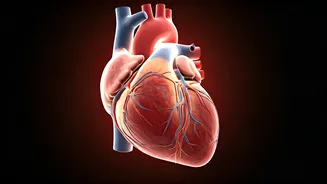Dangerous Everyday Habits
A heart surgeon has pinpointed five everyday habits that pose significant threats to heart health. These habits, often overlooked, can substantially increase
the risk of cardiovascular diseases. The surgeon's ranking provides a clear framework for understanding and addressing these risks. The article offers insights to help you identify and modify these behaviors to protect your heart.
Plaque Formation Explained
The article explains the process by which plaques form in arteries, a key factor in heart disease. Plaques, composed of cholesterol, fats, and other substances, gradually accumulate within the artery walls. This buildup narrows the arteries, restricting blood flow and potentially leading to serious complications like heart attacks and strokes. Understanding this mechanism is the first step towards prevention.
Reversing Arterial Damage
The good news is that there are ways to potentially reverse the damage caused by arterial plaques. The article outlines strategies that can help improve heart health and may even reduce the impact of existing plaques. This involves a combination of lifestyle changes, including dietary adjustments, regular exercise, and, in some cases, medical interventions. Early detection and proactive measures play a crucial role in this process.
Dietary Recommendations
Diet plays a crucial role in heart health. The article likely suggests dietary modifications to help manage and prevent heart problems. These include reducing saturated and trans fats, incorporating more fruits, vegetables, and whole grains into the diet, and limiting processed foods and added sugars. Focusing on heart-healthy foods can significantly impact the health of the arteries and the cardiovascular system as a whole. A balanced diet is critical.
Exercise and Activity
Regular physical activity is another essential element for promoting heart health and reversing arterial damage. Exercise helps improve blood flow, strengthen the heart muscle, and manage weight. The article likely recommends engaging in a variety of exercises, including both cardiovascular activities and strength training. Regular exercise helps improve overall cardiovascular health. Aim for at least 150 minutes of moderate-intensity exercise or 75 minutes of vigorous-intensity exercise per week to improve heart health.
Lifestyle Modifications
Beyond diet and exercise, certain lifestyle adjustments can significantly benefit heart health. This includes avoiding smoking, limiting alcohol consumption, and managing stress effectively. The article provides tips on how to implement these changes, such as stress-reduction techniques and strategies for quitting smoking. These lifestyle choices contribute to overall cardiovascular well-being. Taking action can have a big impact.















